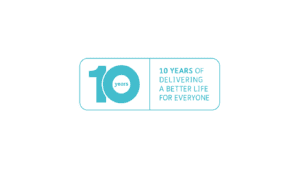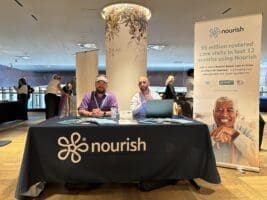Ensuring the people you support are hydrated and getting enough fluids is a big talking point across the health and social care sector. Fluid intake can be affected by the weather, a person’s mood, mobility, falls and more. Dehydration in care homes for older adults particularly, can be linked to increased falls, delirium, increased urinary tract infections and excessive use of antibiotics. Barnet and Chase Farm NHS Trust (London), the University of Oxford, and the London School of Hygiene and Tropical Medicine found that people who live in care homes are more likely to be dehydrated. This is likely due to health conditions, medication, mobility and varying capacity.
There are many creative ways you can increase the amount of fluid the people you support drink by incorporating them into your activity programme.
Preparation and participation for hydration
Studies show that encouraging participation with food preparation can be a powerful tool for creating a positive experience. Stimulate the senses by encouraging conversations, independence and participation with food making, thereby increasing appetite. For many older adults living in care services, food preparation will have been a large part of their life and living in a care service can often feel like a loss of independence. The inclusion in food preparation enhances a sense of purpose and usefulness, boosting confidence and self-esteem, as well as promoting an interest in food and mealtimes.
Soup and Smoothies
Creating different smoothies not only encourages fluid intake but also fruit and veg intake. You can either create a variety of flavours and taste test them or encourage the people you support to make their own smoothie or soup from start to finish. This activity is great for finger dexterity, promoting independence and encouraging conversation and reminiscence on favourite foods and flavours.
Mocktails
Just by simply dressing up a smoothie to look like a mocktail can make a drink more appealing and exciting. Try adding a shot of grenadine to an orange drink, sugar with food colouring around the outside of the cup, umbrellas and other decorative items to not only make the drink look more appealing but also add a positive experience. These small additions can take a drink from being a necessity to being reminiscent of a holiday by the pool. The drink can go hand in hand with reminiscing about holidays, summer and favourite drinks.
Desserts: Ice lollies & jelly
If the weather is hot, hydration becomes even more important. Offering ice lollies is a great way to keep cool and keep the people you support hydrated. You could offer the ice lollies outside if you have outdoor space. You could either take the people you support to the seaside, or, if that’s not possible, bring the beach to them with sensory activities like sand, water, fish and chips and ice lollies or ice creams.
Jelly is another dessert that has hidden fluid. This could be part of an afternoon snack or lunch or dinner for dessert one day or be part of a bigger activity. Have a throwback activity where you serve the food the people you support reminiscent of their childhoods. Jelly and ice cream was a big part of children’s parties, so this is a great opportunity to reminisce about parties attended as a child or throwing parties for their own children and encourage a positive association with food.
Coffee Mornings
Hosting coffee mornings or outings to local cafés or garden centres are another way to encourage hydration and reducing loneliness at the same time. We can take going for a coffee with a friend is for granted; encouraging these activities can have a positive impact on mood, self-esteem and fluid and nutritional intake.
How can Nourish help with hydration?
Assisting the people you support to remain hydrated is essential to their care. Some care services employ Hydration Assistants whose sole focus is to assist the people they support in remaining hydrated. Digital social care record platforms are also beneficial in keeping track of and monitoring fluid efficiently.
By using Nourish, you can record and monitor the fluid intake of the people you support. You can set fluid targets and set alerts and warnings if a person’s fluid intake is below target to investigate why this may be and give you the opportunity to provide further support on this.
Logging information and observations accurately can make vital connections with other events that may be linked to the fluid intake. With data recorded on Nourish, you are able to spot and track trends in hydration, what may have led to lower fluid intake and the impact of this to predict future events.
By using Nourish, you can also record photos of the people you support engaging in activities, to showcase and evidence their enjoyment. Recording photos are a great memento for the people you support’s families and friends and to look back on themselves.
Book a Demo to Find out more about how Nourish can help with proper hydration.








